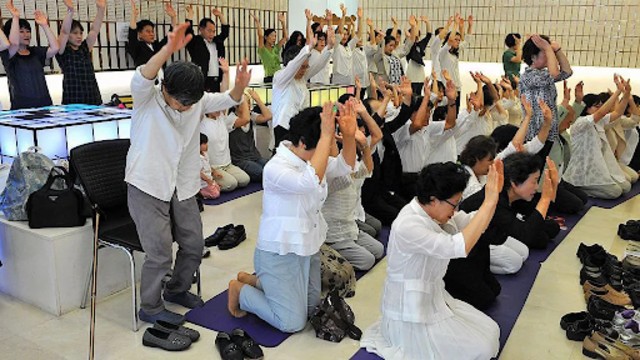
The Unification Church, founded in South Korea, has been active in Japan since the 1960s. Getty Images
A Japanese court has ordered the Unification Church, also known as the "Moonies," to disband. The ruling comes after an investigation into the group’s shady financial practices, which were exposed following the shocking assassination of former Prime Minister Shinzo Abe in 2022.
The man accused of killing Abe claimed he held a grudge against the former leader due to his links with the church. The suspect blamed the group for bankrupting his family, alleging that his mother had been manipulated into making massive donations.
Japan's education and culture ministry pushed for the church’s dissolution, accusing it of exploiting followers by forcing them to make large financial contributions. However, the church argued that the donations were part of its religious activities. The group still has the right to appeal the decision.
The Tokyo district court's ruling will strip the church of its tax-exempt status and force it to sell off its assets. However, it will still be allowed to continue its religious activities in Japan.
During the investigation, authorities found that the church preyed on followers' spiritual fears to pressure them into buying expensive religious items. Officials interviewed around 200 people who claimed they were financially exploited by the church.
The Unification Church, founded in South Korea in the 1950s by Sun Myung Moon, has been active in Japan since the 1960s. The nickname "Moonies" comes from the founder's name. The group has long been controversial for promoting mass wedding ceremonies, where thousands of couples marry at once, often without knowing each other beforehand.
Since 2023, around 200 former members have filed lawsuits against the church, claiming they were forced into donating large sums. Their legal representatives estimate the claims total approximately 5.7 billion yen (about $38.5 million).
Abe's assassination also revealed the church's deep connections with Japanese politics. Investigations found that several conservative lawmakers from the ruling Liberal Democratic Party (LDP) had close ties to the church. These links included attending church events, accepting donations, and even receiving election support.
The scandal led to the resignation of four government ministers. Former Prime Minister Fumio Kishida’s LDP conducted an internal review and found that 179 of its 379 lawmakers had interacted with the church in some form.
The revelations shocked the nation, as many citizens were unaware of the extent of the church’s influence in politics. The court’s decision to disband the group is seen as a major step in holding it accountable for its financial practices and political entanglements.















